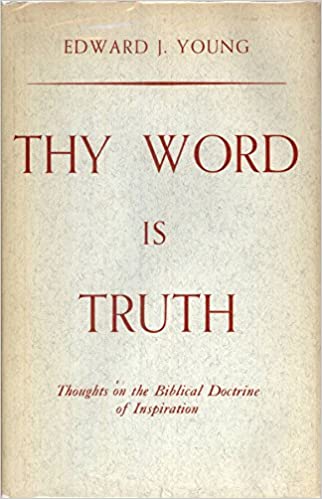A Brief Book Summary from Books At a Glance
by Steve West
About the Author
Edward Young was a leading conservative Bible scholar and teacher. He was Professor of Old Testament at Westminster Seminary in Philadelphia for many years, as well as the author of widely read and highly regarded books.
Introduction
This book deals with issues and challenges to the doctrine of the infallibility and inerrancy of Scripture. Young sets forth the biblical doctrine, Christian presuppositions, and theological formulations about the doctrine of Scripture. He deals with objections and alternative views, as well as with alleged errors and contradictions in Scripture.
Table of Contents
Chapter 1 The Issue Before the Church
Chapter 2 The Extent of Inspiration
Chapter 3 The Human Writers of Scripture
Chapter 4 Some Reflections Upon Inspiration
Chapter 5 What is Inerrancy? (I)
Chapter 6 What is Inerrancy? (II)
Chapter 7 Are There Errors in the Bible?
Chapter 8 Does It Matter How We Approach the Bible?
Chapter 9 Some Modern Views of the Bible (I)
Chapter 10 Some Modern Views of the Bible (II)
Chapter 11 The Bible and Salvation
Summary
Chapter 1: The Issue Before the Church
The church always stands at a crossroads because Christ calls us to obedience. Today, we need to decide if we will follow the voice of God and embrace supernatural religion or follow man-made religions. One of the most important issues of our time is the nature of Scripture (i.e. what is the Bible?). Contemporary people like to think of it as the words of men that expresses opinion, and they do not believe it is the Word of God. The historic view of the church that the Scriptures are inspired and inerrant has been set aside for rationalism and critical methods that are approved of by modern thinkers. None of the conclusions of the critical methods have been established, however.
We need to see what the Bible has to say about itself. This is not difficult, and no technical expertise is required. The Bible teaches that all Scripture is inspired by God. It is breathed out by God; Scripture is his word from his mouth, the divine breath. Scripture has its origin in the mind and breath of God. Peter claims that every prophet was moved along by the Holy Spirit—the Spirit, not the prophet, is the source of revelation. Prophets were passive while God was active. Human beings actually spoke for God. Still, it is important to realize that they were not automata. God used their unique skills, knowledge, styles, etc. Jesus said that the Scriptures cannot be broken. They have the authority of God and are free from error. Since the Bible clearly teaches that it is the Word of God, people need to decide if the Bible is still the authority of the church.
Every doctrine that Scripture teaches is to be accepted on the authority of the Scriptures, and this must apply to the doctrine of Scripture itself. If the Bible is not trustworthy when it speaks of itself, why would we accept it as trustworthy when it speaks on other topics? In the end, we need to decide if we will listen to God or human beings. The redemptive message of the Bible comes from God. Seeing the message through natural eyes is of no avail; God’s Spirit must give us eyes to see. When we are given spiritual life, we hear our Father’s voice in the Word. We need to pray that God will help us see the truth and that others will as well. . . .
[To continue reading this summary, please see below....]The remainder of this article is premium content. Become a member to continue reading.
Already have an account? Sign In
Buy the books

THY WORD IS TRUTH: THOUGHTS ON THE BIBLICAL DOCTRINE OF INSPIRATION, by Edward J. Young